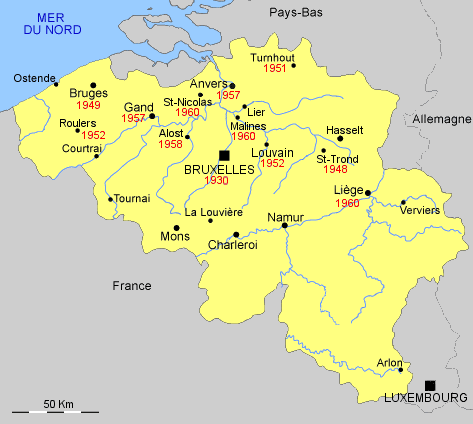History of Coca in Belgium
On June 17, 1930, the company Coca-Cola Belgique S.A. was founded in order to launch the product throughout the country. At the end of 1931, their own bottling site was created rue de Belgrade (commune of Saint-Gilles in the Brussels-Capital region).
The first capsules indicate that the excise duties have been duly paid. From 1935, the workshop in the rue de Belgrade became too cramped and the Coca-Cola Belgium company moved to the chaussée de Ruysbroeck (municipality of Forest in the Brussels-Capital region).
For lack of supply, production was interrupted in 1940 but resumed at the end of the war with the creation on December 16, 1947 of the new company "The Coca-Cola Export Corporation "which takes over the activities of" Coca-Cola Belgique S.A. ".
The new distributors
The end of the war also saw the reorganization of the bottling and distribution system by the appearance of independent concessionaires. One of the keys to Coca-Cola's success in European expansion in the aftermath of World War II was its franchising system. Bottling units were heavily decentralized and owned by independent companies, this system imposed itself on its own due to a lack of road infrastructure.
The first bottler-distributor was established in Sint-Truiden in 1948 with the "N.V. Sint-Truiden Moderne Aftrekkerij" (S.A. Saint-Trond Soutirage Moderne in French).

In 1949 creation in Bruges of the "NV. SOBRUMO"
In 1951 and 1952 creation in Turnhout ("Van Mielders"), Roeselare ("N.V. Rodima") and Louvain ("N.V. Solomo").
In 1957 in Antwerp ("Van Mielders", now "Antwerpse Bottelmaatschappij") and in Ghent ("Van Mielders", then "Ganco" and "VBM").
In 1958 in Aalst ("N.V. Vandenameele").
In 1960 in Liège ("Compagnie Liègeoise des Boissons", now "Cobosud", then "Colibo"). In Mechelen ("Melibo"); in Saint-Nicolas ("Waase Bottelmaatschappij").
In Spontin and Chaudfontaine ...
Towards the ned of the 1970s there were 15 depositories and bottlers/distributors.
The reorganization of the distributing companies
From 1977 many movements took place among the bottlers/distributors.
In 1977, the Sint-Truiden unit was transferred to Hasselt and became "LIMOBO". Likewise, "MELIBO" moved in Lier and took the name of "Lierco". A last company settled in Ghlin near Mons ("BRASSICO").
Takeover by Coca-Cola
The franchise policy ended in 1982, when the management of the American group began to encourage the regrouping of franchisees but also to buy them out when their performance lstarted to underperform.
In November 1988, Les Eaux de Spontin lost their contract for the bottling of 1.5-liter plastic bottles.
Around 1989/90, Coca-Cola took over, through its new subsidiary SA Beverages Holding (1989), the dealers in Aalst, Bruges and Hasselt who were at the end of their contract.
At the end of 1991, only two independent Coca-Cola bottlers remained in Belgium, the company ABM (Antwerpse Bottel Maatschappij) and the Interbrew group.
On November 16, 1993, the Interbrew group sold its shareholdings which it held in the distribution and bottling companies of Coca-Cola Company products, ie not only Coca, but also Sprite, Fanta and Minute Maid. The companies Belbottling, Socodrink and Coca-Cola Bottling (South & West Belgium) pass thus under the control of SA Coca-Cola Beverages (1991) NV and are absorbed a month later by Socodrink.
On August 5, 1994, Socodrink acquired all of the shares in Antwerp which it absorbed 16 months later.
In 1995, the Brussels plant ceased its activities. In 1997, production was stopped in Hasselt, only the production centers of Antwerp, Ghent and Bruges remained.
On February 14, 1996, Socodrink becomes SA Coca-Cola Beverages Belgium NV. It was sold to Coca-Cola Enterprises, Inc. in July 1996 and changed its name to Coca-Cola Enterprises Belgium SPRL in July 1998.





